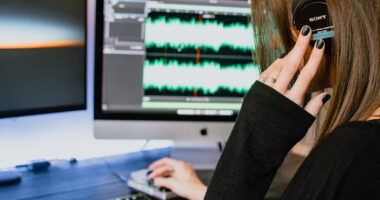Independent musicians now have greater options than ever before to interact with fans and promote their music thanks to the digital era. Developing a successful career in the music industry requires a lot of DIY music marketing, or do-it-yourself music marketing. Reaching a larger audience requires you to take charge of your own marketing initiatives and make use of a variety of tactics and resources. This blog post will discuss the value of DIY music marketing for independent musicians and give a summary of the subjects that will be discussed. This post will offer helpful insights & useful advice to help you navigate the constantly shifting music industry, whether you’re just getting started or looking to improve your current marketing efforts. A music industry database is an extensive compilation of contacts and data about the music business.
Key Takeaways
- DIY music marketing can be a cost-effective way for independent artists to promote their music.
- Understanding the music industry database can help artists target their promotions to the right audience.
- Creating a music promotion plan is essential for organizing and executing effective marketing strategies.
- Building a strong music marketing strategy involves utilizing multiple channels, including social media and email marketing.
- Measuring the success of your music marketing efforts is crucial for refining and improving your strategies over time.
It contains information on booking agents, promoters, record labels, music publishers, and other business associates. For independent musicians, having access to a Music Industry Database is essential because it helps them locate contacts and opportunities that can advance their careers. Artists looking for particular contacts based on their genre, region, or other parameters can do so by using a music industry database. They can connect with the appropriate individuals who might be interested in their music thanks to this.
A music industry database can also offer insightful information on current market trends, forthcoming events, and other opportunities that artists can take advantage of. Independent musicians must have a well-thought-out plan for promoting their music. It keeps them focused and organized and acts as a road map for their marketing initiatives. The objectives, target market, strategies, and tactics for promoting an artist’s music are described in a music promotion plan. Artists should first identify their objectives in order to develop a coherent plan for music promotion. Their objectives might be to gain more followers, obtain more downloads or streams, schedule more performances, or land a record deal.
Artists can then determine their target market and adjust their marketing strategies based on the goals they have set. Social media platform utilization, content creation, email marketing, networking and artist collaboration, and keeping abreast of trends and techniques in music marketing are a few examples of successful music promotion strategies. An artist’s entire plan outlining how they will promote their music is called a music marketing strategy. To reach the target audience, it entails identifying the demographic to target, defining the music artist’s USPs, & figuring out the best marketing channels & strategies.
| Metrics | Values |
|---|---|
| Number of DIY music marketing tips | 25 |
| Number of DIY music marketing tricks | 15 |
| Number of pages in the book | 150 |
| Number of social media platforms covered | 6 |
| Number of case studies | 10 |
| Number of worksheets included | 5 |
| Number of recommended tools and resources | 20 |
Independent musicians need a solid music marketing plan to differentiate themselves in the competitive market & reach their target audience with their music. Also, it makes sure that their marketing initiatives are targeted and in line with their overarching objectives. Artists should first study their target market and rivals in order to develop a solid music marketing plan. After that, they ought to identify their USPs and create an engaging brand narrative that appeals to their intended market. Ultimately, in order to effectively reach their target audience, artists should determine the best marketing strategies & channels to use, then set aside funds appropriately.
The way musicians promote their music has been transformed by social media. It gives musicians a way to communicate directly with their audience, distribute their music, and develop a devoted following. It is impossible to exaggerate the value of social media for promoting music. Artists can use a variety of social media platforms, such as YouTube, Facebook, Instagram, Twitter, and TikTok.
For musicians looking to promote their music, each platform offers special features and benefits. For instance, artists can set up a specific page on Facebook on which they can post updates, pictures, videos, and live streaming. Instagram is a great visual platform for sharing content from behind the scenes & interacting with fans via live videos and stories. Twitter is an excellent way to interact with fans & business people, as well as to share brief updates. Artists should choose the platforms that are most popular with their target audience after determining who their target audience is in order to use social media for music promotion.
After that, they ought to produce interesting and captivating content that appeals to their followers. On social media, consistency is crucial, so artists should make it a point to post frequently & engage with their followers on a regular basis. To draw in followers and stand out in a crowded market, one must produce interesting content. Music videos, behind-the-scenes videos, live performances, interviews, and blog posts are just a few of the content kinds that musicians can produce to promote their music.
In order to engage their audience more deeply, artists should try to tell a story through their work. They ought to demonstrate their individuality, inventiveness, and love of music. It’s crucial to try out various kinds of content and see what appeals to your audience. For instance, live performances may increase engagement for certain artists, but behind-the-scenes videos may be more well-liked for others. Artists should not only produce interesting content but also optimize it for social media and search engine algorithms.
To do this, use pertinent hashtags, descriptions, and keywords to make their content more visible. Fans can be reached and engaged with through email marketing, which is a potent tool. It enables performers to interact with fans directly and cultivate a devoted following. One should not undervalue the significance of email marketing in the promotion of music.
Artists can collect email addresses from fans by offering discounts, free downloads, or access to exclusive content as incentives to grow their email list. Also, they can use their website, social media accounts, and live performances to advertise their email list. Artists can use email marketing campaigns to effectively promote their music once they have an email list.
This entails providing their subscribers with customised offers, special content, & frequent updates. To make sure that the content is interesting and relevant, it’s critical to segment the email list according to the tastes and interests of the fans. Building a successful career in the music industry requires networking and working with other artists & industry professionals. It offers chances for growth, learning, & exposure.
Artists can increase their fan base, acquire fresh perspectives and insights, and open doors to new opportunities by networking & working together. Artists should connect with other artists and industry professionals, participate in online communities, and attend industry events to effectively network & collaborate. When establishing connections & providing value to others, they ought to be proactive. Working together on songs, co-writing tracks, or performing live are just a few examples of the various ways that people can collaborate.
In the music industry, there are many instances of successful collaborations. Beyoncé, for instance, has worked with Jay-Z on several albums and songs, which have been a huge hit and received positive reviews. Another instance is Calvin Harris and Rihanna’s collaboration on the hit song “We Found Love,” which peaked at the top of the charts all over the world. To find out what works & what doesn’t, it is imperative to measure the effectiveness of music marketing campaigns. Artists can use it to optimize their marketing strategies & make data-driven decisions that lead to better outcomes.
Artists can monitor multiple metrics, such as streams, downloads, social media engagement, website traffic, & email open rates, to assess the effectiveness of their music marketing endeavors. Email marketing software, YouTube Analytics, Google Analytics, Spotify for Artists, and other platforms and tools are available for artists to use in order to monitor and evaluate these metrics. The demographics, engagement levels, & conversion rates of the audience can all be learned from these tools. Artists can enhance their music marketing efforts by strategically observing and evaluating these metrics, which help them recognize patterns, seize opportunities, and make well-informed decisions. It’s critical for musicians to stay current with the newest methods and trends in music marketing since the music industry is always changing. Artists can modify their tactics & maintain an advantage over their competitors by remaining knowledgeable.
Artists can keep up with the latest trends and strategies in music marketing by using a variety of resources. Online courses, webinars, podcasts, blogs, and industry publications fall under this category. To keep up with the latest trends, artists should also follow thought leaders and industry influencers on social media. Live streaming, virtual performances, influencer marketing, user-generated content, and interactive experiences are a few of the trends and strategies used in music marketing today. Artists can interact with their audience in fresh and engaging ways by implementing these trends and techniques into their marketing strategies. In summary, independent musicians who aspire to have a prosperous career in the music business must engage in DIY music marketing.
Through self-management of their marketing initiatives and the application of diverse tactics and resources, musicians can expand their fan base and establish a more meaningful connection. We have discussed the value of DIY music marketing in this blog post and offered artists useful advice and techniques to put into practice. There are many ways for artists to improve their music marketing efforts, including knowing the music industry database, producing interesting content, using social media, optimizing email marketing, networking and working together, gauging success, and following trends. We urge independent musicians to advance their music marketing by putting the advice and techniques covered in this blog post into practice.
We can help one another along our musical journeys by forwarding this article to other independent artists who might find use for DIY music marketing advice and techniques. We can change the music industry for the better if we work together.
Looking for some expert advice on DIY music marketing? Check out this informative article on MusicPromotion.tech titled “Hello World: A Beginner’s Guide to DIY Music Marketing.” This comprehensive guide covers everything you need to know about promoting your music independently, from building a strong online presence to utilizing social media platforms effectively. Whether you’re just starting out or looking to enhance your existing marketing strategies, this article is a must-read. Don’t miss out on valuable insights and tips – click here to read the full article! https://musicpromotion.tech/hello-world/
FAQs
What is DIY music marketing?
DIY music marketing refers to the process of promoting and distributing music independently without the help of a record label or professional marketing team.
Why is DIY music marketing important?
DIY music marketing is important because it allows artists to have more control over their music and career. It also allows them to save money on marketing expenses and potentially earn more revenue.
What are some DIY music marketing strategies?
Some DIY music marketing strategies include social media marketing, email marketing, networking, creating a website, and utilizing online music platforms.
How can social media be used for DIY music marketing?
Social media can be used for DIY music marketing by creating a strong online presence, engaging with fans, promoting music releases and events, and collaborating with other artists.
What is email marketing and how can it be used for DIY music marketing?
Email marketing involves sending promotional emails to a list of subscribers. It can be used for DIY music marketing by building an email list of fans and sending them updates about music releases, events, and merchandise.
What is networking and how can it be used for DIY music marketing?
Networking involves building relationships with industry professionals and other artists. It can be used for DIY music marketing by collaborating with other artists, getting gigs through connections, and getting advice from industry professionals.
What are some online music platforms that can be used for DIY music marketing?
Some online music platforms that can be used for DIY music marketing include Bandcamp, SoundCloud, YouTube, and Spotify. These platforms allow artists to distribute and promote their music to a wider audience.





